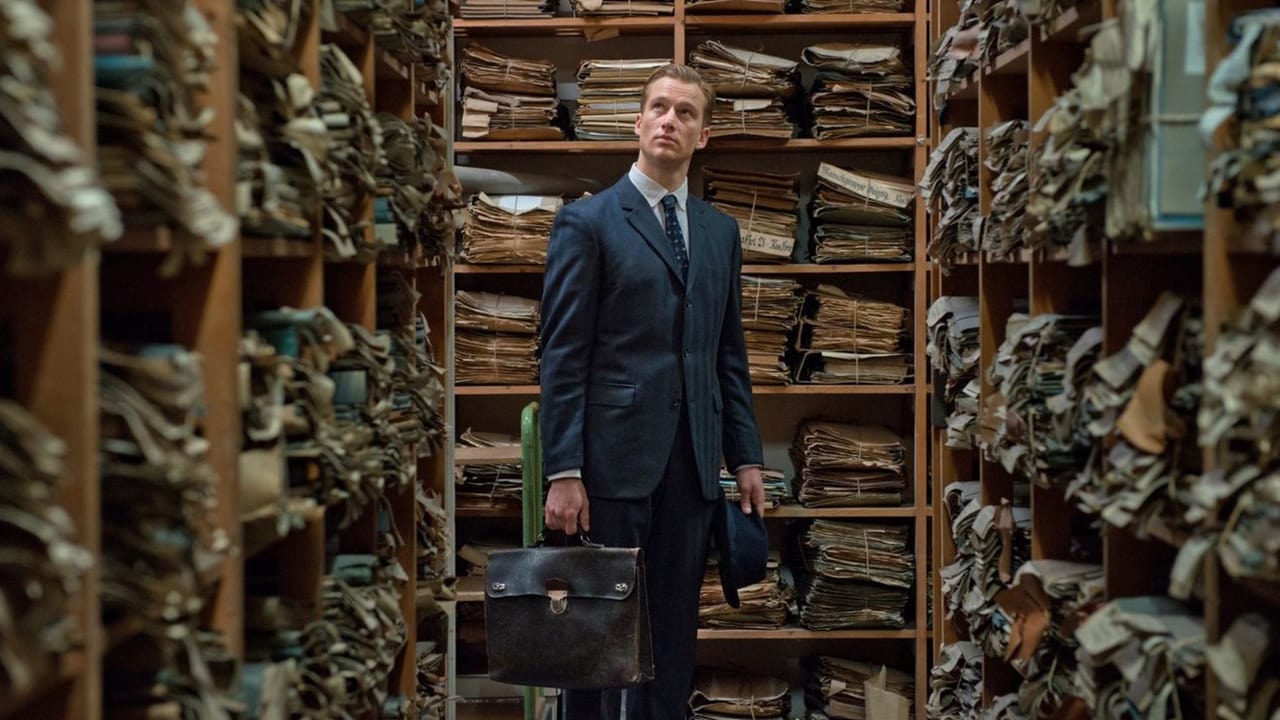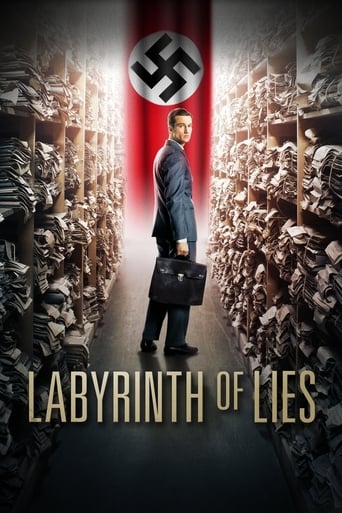

In 1958, the German people had very little knowledge of the death camps of World War II. A Jew, whose children were experimented upon, demands to be heard but is ignored by the legal system. A young lawyer hears his pleas but doesn't know what he can do. When he proposes action, he is ignored or scolded by those that would be of the most help. He finds a small group of people that are working on the cases in the camps. He wants the big fish, Joseph Mengele, and forgets about those who were in the SS or who acted like savages in the camps. This is about a man who is so driven that he can't come to grips with the idea that most of the country were Nazis, including those close to him. He get very emotional in his all-or-nothing quest and alienates people. He even dismisses the children of Nazis, even if they had nothing to do with anything. He is angry with all of Germany but doesn't ask why this all happened. This is a film about seeing what is most important in our lives--what can be changed and what can't. The ultimate trial proved to be one of the most important in modern history.
... View MoreLabyrinth of Lies deals with a pretty much forgotten chapter in German history—the 1963 Frankfurt Auschwitz trials. State prosecutors in the German city of Frankfurt brought former mid-and-low level functionaries of the Auschwitz death camp to trial despite opposition from Nazi sympathizers and an apathetic public. Perhaps the most surprising thing one learns from the film is just how ignorant the general population was of Auschwitz and the Nazi era when the story begins in 1958.The protagonist is a composite character, Johann Radmann, based on three real-life prosecutors, played by the popular German actor, Alexander Fehling. When we're first introduced to Radmann, he has a low level job in the prosecutor's officer handling traffic violations. His by-the-book demeanor immediately becomes apparent when he refuses to allow a pretty Fraulein, to pay a reduced fine for a traffic infraction.Through the efforts of Tomas Gnielka, a journalist obsessed with Germany's embrace of Nazism, Radmann soon gets wind of a former Auschwitz guard now working as a school teacher. Radmann is rebuffed by the lead prosecutor in the office who disparages him for taking an interest in the former Auschwitz guard—in the lead prosecutor's view, this will only open up a can of worms. But a higher-up, Fritz Bauer— the Attorney General-- is sympathetic toward efforts to uncover the crimes of the Nazi past, and appoints Radmann as the special prosecutor responsible for prosecuting those responsible for crimes at the death camp.Radmann gets his first leads from Simon Kirsch, an Auschwitz survivor, introduced to him by Gnielka. Kirsch is uncooperative at first but later, along with other survivors, provides important testimony that will aid Radmann in his quest to bring various Auschwitz functionaries to justice. Radmann also digs up evidence from files at an US Army base. Director Giulio Ricciarelli does well in chronicling the extreme state of denial many Germans were in as they grappled with the legacy of Nazi horrors. There are also sympathizers who do everything they can (including throwing a rock with a swastika on it, through Radmann's window), to derail him from finishing his job. You would never guess that the actual Auschwitz participants who now have ordinary jobs were stone-cold killers, just a little over a decade before.Labyrinth of Lies gets bogged down when Radmann becomes obsessed with tracking down the notorious "Butcher of Auschwitz", Dr. Josef Mengele, in spite of orders to desist from his boss Bauer. Radmann's efforts to capture Mengele prove fruitless, despite having learned that Mengele has been returning to Germany from South America to visit his relatives. Since we already know that Mengele was never captured, there is very little point in chronicling Radmann's unsuccessful quest for a good part of the second half of the narrative.Radmann has his "dark moment" of the second Act, when he becomes overly self-righteous in holding his fellow Germans to account for their indifference during the Nazi years. It turns out that Gnielka, the fanatically anti-Nazi journalist, was actually a 17 year old worker at the death camp; and Redmann's girlfriend, Marlene, has been making profits in selling clothes to the wives of former Nazis. At one point Radmann quits the prosecutor's office and signs on with a hot-shot attorney but eventually sees the light and agrees to finish his prosecutorial duties.Labyrinth of Lies is a valuable film in that it paints an indelible portrait of a society coming to grips with its dark past. While not everything works in the film (the Mengele sequence is particularly overdone), the exploration of this largely forgotten chapter in German history, is most welcome.
... View MoreLabyrinth of Lies is a 2014 German film about the Frankfurt Auschwitz trials that took place between 1963 and 1965. What distinguished the Frankfurt trails from all the other trials was that they were based on German law and because they happened 20+ years after the war, they were limited to murder charges. Several Nazis had been tried previously but they were convicted under international law and occurred right after the war.The film begins in 1958 as a young prosecutor Johann Radmann (marvelously played by Alexander Fehling) is attracted to the case by a reporter (Andre Szymanski), and given support by the federal Attorney General (Gert Voss who is simply riveting). They must work against the denials, cover-ups and vested interests that try to keep the issue quiet.The film gives you a real feel of the late 50s, and the photography and music support an excellent cast who do wonderful work. In a film about the holocaust, there is a tendency to shock, but director Giulio Ricciarelli skillfully shows that less is more.There are some places where the film seems more like a docudrama, and some issues (e.g., Radmann's relationship with his mother) are only hinted at. But overall it's an excellent film, and while it may not be an equivalent to "Judgment at Nuremberg", it is well worth viewing.
... View MoreThe English title "Labyrinth of Lies" should rather be a direct translation from the German title which is more among the lines "Labyrinth of Silence". And that's precisely what the main character is facing in his quest of uncovering the crimes Germany committed during WWII.This film poses a not very often portrayed link in the chain of events during and following WWII. People in Germany are used to dealing openly with the crimes committed during WWII to the point where the time when it was not like that is barley remembered. It deals with the topic in a very non sensational way. Awful crimes are not portrayed too visually and yet the film manages to transmit the severity of those. It also explores the German people's psyche after the war and the motivation behind covering up what happened.The cinematography is quite nice and the music fits the time and setting.A downside to the film is its romantic relationship between the main character and his love interest. It was hard to connect to their relationship and to her. Her relevance for the story was not very clear as well. Also the screenplay felt off at times. Whenever a character had a monologue it was very catching and filled with emotions one could connect to. Unfortunately it failed in delivering meaningful conversations. They were most of the time superficial and felt stiff.All in all it was a very interesting film with a relevant message but quite a few downsides in delivery. It feels like the big screen is a little too big for this film but it is quite a nice TV film and a good starter to get into post war history.
... View More